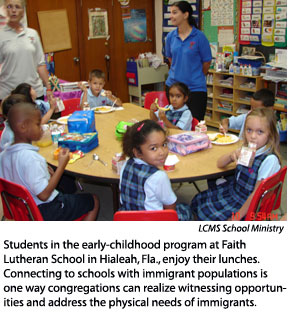By Karen Boettcher
This commentary is in response to the “Statement Regarding Immigration Concerns” issued June 2 by Dr. Gerald Kieschnick, LCMS president, and Rev. Matthew Harrison, executive director of LCMS World Relief/Human Care. The commentary — written from the perspective of a principal in a public school with a large immigrant population — considers how congregations can respond to immigrants in the community by linking to schools.
It is Monday morning at an elementary school in the city. The school is diverse, with students from several 
While this account is hypothetical, situations like this occur daily at schools of all sizes throughout the United States. Like our German and Scandinavian ancestors who arrived in America more than 100 years ago, immigrants continue to make their way to the United States in search of a better and brighter tomorrow.
Why do they leave family and friends behind, sometimes even risking their lives to start a new life? Most immigrants are seeking the “American dream” of a good education, freedom from oppression, and a well-paying job. They strive to learn English, which may take up to seven years to master. Often, the children teach their parents how to speak and read English.
Are these families “legal” or “illegal”? That is not a question that is asked by school administrators when children enroll. Rather, it is an inquiry that employers of immigrants must deal with to stay within the law.
Assumptions cannot be made that all immigrants are illegal — many do have legal documentation. The responsibility of the school is to enroll, educate, and care for the children. It is the job of the legal system to enforce the immigration laws.
Laws, accepted behaviors, and values from the immigrant’s home country may be different from those in the United States. Education about various legal topics such as citizenship, money management, house ownership, and employment is essential in order for immigrants to understand how to become law-abiding citizens in their adopted country.
As we try to gain an understanding of immigrant families and their needs, what should be the church’s response to immigrants who are spread from rural settings to the largest cities?
Congregations that connect to schools with immigrant populations can realize witnessing opportunities and can work with the schools to address the basic needs of immigrants, such as tutoring students after school. Besides providing a needed skill, tutoring builds relationships with students and families that may lead to opportunities to share the Gospel.
Churches also can reach immigrant families — and create more witnessing opportunities — by opening their doors to provide food banks, free dinners, free clothing, and evening English classes for adults. Concordia Publishing House offers religious materials in Spanish that can be adapted for use by English-speaking congregations. And, translators can be hired to act as liaisons between the English-speaking congregation and its Spanish-speaking neighbors.
Legal issues may surface as church members witness to immigrants, and Christians should encourage and assist those who are illegal to become legal through appropriate channels.
Complex, heartbreaking stories and issues often emerge:
- The parents may not be legal, but the children have been born in the United States and are legal. If the parents are deported, who will take care of the children?
- One of the wage-earning parents is deported and the other parent remains with the children but is left without adequate income to provide food and shelter. Who will take care of them?
- The immigrant is mistreated by an employer or neighbor, but is afraid to report it out of fear he or she will be deported or left without a job. Are we to turn away?
- They may need medical care and have no resources to get the needed care. As Christians, what should be our response?
God told Moses to tell the people, “Never mistreat a foreigner living in your land. Foreigners living among you will be like your own people. Love them as you love yourself, because you were foreigners living in Egypt. I am the Lord your God” (Lev. 19: 33-34).
Mission is often thought of as far away. But we have a mission field close by, in many of our communities. We are a nation filled with immigrants. Many do not know Jesus. How can your church or school help? How can you as an individual help? We have been given an opportunity to be Ablaze! with the Gospel right in our own communities. Let us be Ablaze! with the immigrants among us!
Karen Boettcher is a member of Holy Cross Lutheran Church in Wichita, Kan., and principal of one of the largest public elementary schools in Kansas.
Posted Dec. 4, 2006
